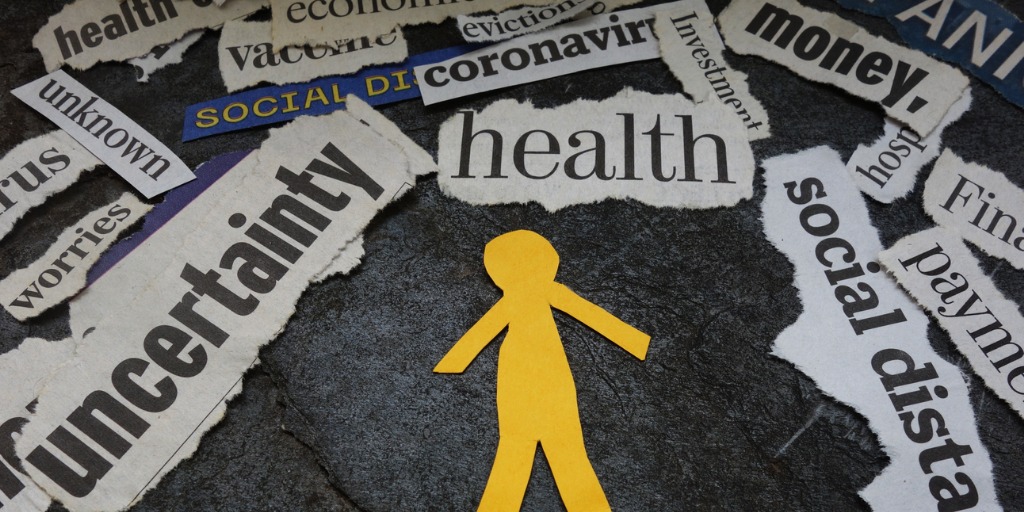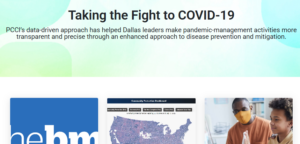
DALLAS – Towards the end of March, Parkland Center for Clinical Innovation’s COVID-19 Vulnerability Index has recorded the lowest infection risk since the Vulnerability Index launched in June of last year.
 “After the holidays, we had vulnerability index ratings at nearly 200, which meant the COVID-19 virus was running rampant through our community,” said George “Holt” Oliver, MD, Vice President of Clinical Informatics at PCCI. “It is a great relief to see that the highest vulnerability index rating now is only 16.91. This is a triumph for our county’s public health leaders, providers and residents who have made the sacrifices and efforts needed to bend the curve.”
“After the holidays, we had vulnerability index ratings at nearly 200, which meant the COVID-19 virus was running rampant through our community,” said George “Holt” Oliver, MD, Vice President of Clinical Informatics at PCCI. “It is a great relief to see that the highest vulnerability index rating now is only 16.91. This is a triumph for our county’s public health leaders, providers and residents who have made the sacrifices and efforts needed to bend the curve.”
One of the hardest hit ZIP Codes during the past year, 75211, which includes the areas around Cockrell Hill and Oak Cliff, saw its vulnerability risk hit the high of 196.9 in January. This was the highest level any ZIP code in Dallas County reached. By mid-March, its vulnerability rating was 8.74, a dramatic improvement for an area facing some of the most sever socioeconomic issues.
“This is very good news for the residents of the 75211 ZIP code; however, we advise caution going forward,” said Dr. Oliver. “I believe that our new normal will be continued vigilance. To keep COVID-19 from resurging, everyone who can be vaccinated should seek it, and adhere to local health official guidance that includes direction on social distancing and face covering.”
Launched in June 2020, PCCI’s Vulnerability Index identifies communities at risk by examining comorbidity rates, including chronic illnesses such as hypertension, cancer, diabetes and heart disease; areas with a high density of populations over the age of 65; and increased social deprivation such as lack of access to food, medicine, employment and transportation. These factors are combined with dynamic mobility rates and confirmed COVID-19 cases where a vulnerability index value is scaled relative to July 2020’s COVID-19 peak value. The PCCI COVID-19 Vulnerability Index can be found on its COVID-19 Hub for Dallas County at: https://covid-analytics-pccinnovation.hub.arcgis.com/.
 Currently, the 75150 ZIP code, at the intersection of Interstate Highway 30 and 635 has the highest COVID-19 risk at 16.91, down from a high of 107.30 in January. The ZIP code 75204, in east downtown Dallas, has the second highest vulnerability level at 15.81, down from a high of 126.5 in January.
Currently, the 75150 ZIP code, at the intersection of Interstate Highway 30 and 635 has the highest COVID-19 risk at 16.91, down from a high of 107.30 in January. The ZIP code 75204, in east downtown Dallas, has the second highest vulnerability level at 15.81, down from a high of 126.5 in January.
PCCI’s forecast of Dallas County reaching COVID-19 herd immunity is still on-track but reaching that threshold is highly dependent residents receiving their vaccinations.
“With vaccinations available to all adults, we need to get in line and get immunized,” said Dr. Steve Miff, PCCI President and CEO. “We don’t want another year to go by where grandparents can’t hug their grandchildren. We have seen how safe and effective the current vaccines are, so it is the responsible thing to do for our friends, families and co-workers to get immunized.”
While always concerning when adverse reactions emerge, the action by the FDA to pause the J&J vaccine is out of “abundance of caution” and it’s a strong signal of how responsive they are to any potential safety concerns. Cerebral venous sinus thrombosis (CVST) with J&J vaccine has been reported in 6 young women (ages 18-48) among 6.8 million doses in the US. To date, Dallas County has administered 61% Pfizer, 35% Moderna, and 4% J&J. The syndrome has been dubbed vaccine-induced immune thrombotic thrombocytopenia.(VITT), based on a similar syndrome after the commonly-used medication heparin abbreviated HITT. The reported rates are much lower than IV Heparin which is used frequently in the hospital. While the risk benefit ratio of continuing to use J& J vaccine in the US COVID-19 vaccination plan may still make sense given the observed case fatality rate of 1.8% of COVID-19, prudence to understand the situation given the FDA emergency use authorization for use is warranted..
The FDA pause for the J&J vaccine will not significantly impact the PCCI initial estimate for Dallas County’s path to herd immunity by June. We were progressing towards herd immunity at a rate of approximately 3% per week, which was ahead of initial predictions. While the allocations for J&J were scheduled to increase and the latest developments will pause those vaccinations likely for days, up to several weeks, we forecast that Dallas county will continue to make progress at 2-2.5% per week, which maintains the pace for mid-June.

A year in retrospective
With the COVID-19 pandemic ongoing for over a year, PCCI identified the zip codes with the highest average vulnerability from July 2020 through March 2021. These represent areas which have faced the highest risk during the COVID-19 pandemic to date.
Data Sources:
To build Vulnerability Index, PCCI relied on data from Parkland Health & Hospital System, Dallas County Health and Human Services Department, the Dallas-Fort Worth Hospital Council, U.S. Census, and SafeGraph.
About Parkland Center for Clinical Innovation
Parkland Center for Clinical Innovation (PCCI) is an independent, not-for-profit, healthcare intelligence organization affiliated with Parkland Health & Hospital System. PCCI leverages clinical expertise, data science and Non Medical Drivers of Health to address the needs of vulnerable populations. We believe that data, done right, has the power to galvanize communities, inform leaders, and empower people.
###
Authors
Steve Miff, PhD., President & CEO of PCCI, George “Holt” Oliver, MD, Vice President of Clinical Informatics at PCCI and Thomas Roderick, PhD, Senior Director of Data and Applied Sciences at PCCI.






